Leadership, Management Theories and Styles: Adecco Group
VerifiedAdded on 2023/06/12
|11
|2741
|469
Report
AI Summary
This report provides an in-depth analysis of leadership and management theories, styles, and their impact on organizational culture, focusing on The Adecco Group as a case study. It discusses various leadership theories such as situational, transactional, and transformational leadership, and their application in organizations like TESCO, ASDA, and Morrison's. The report also evaluates management theories including scientific, behavioral, and human relationship theories. It further assesses different leadership and management styles, such as authoritarian, delegative, autocratic, and democratic, in various business situations. The report also highlights factors influencing the development of organizational culture, such as employees, leadership, resources, and technology, and compares the impact of different leadership and management styles on decision-making. The importance of organizational culture on performance is also evaluated, emphasizing its role in attaining high productivity and performance.
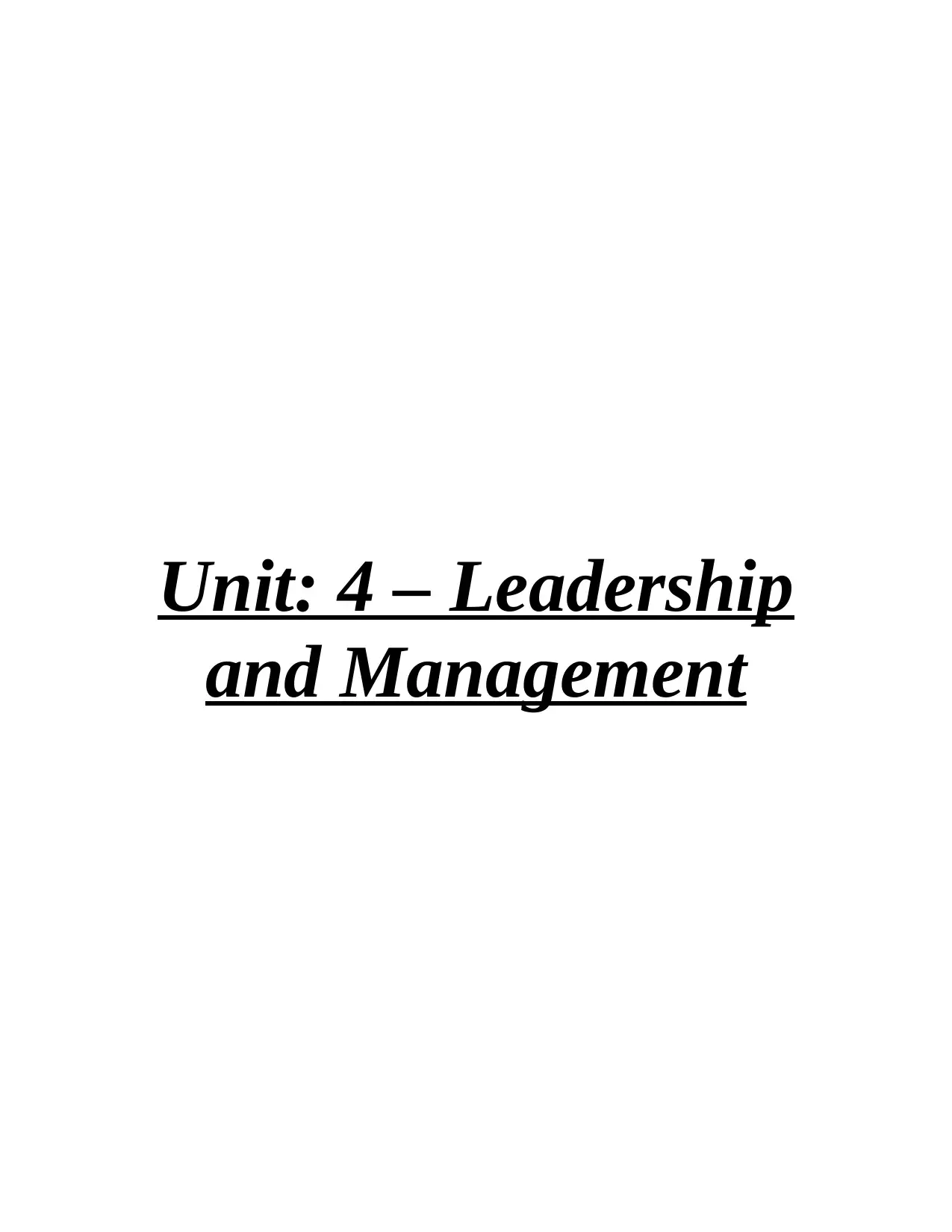
Unit: 4 – Leadership
and Management
and Management
Paraphrase This Document
Need a fresh take? Get an instant paraphrase of this document with our AI Paraphraser
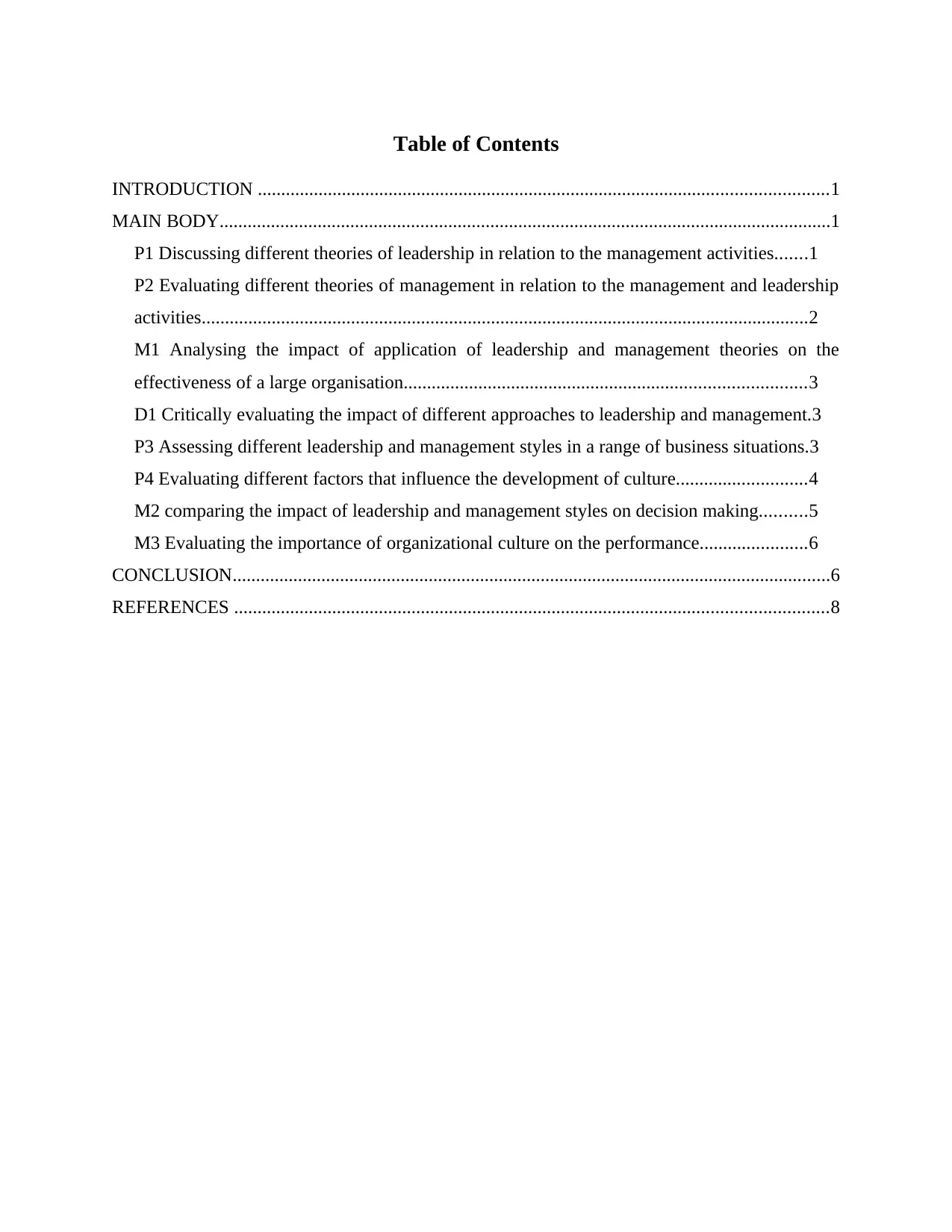
Table of Contents
INTRODUCTION ..........................................................................................................................1
MAIN BODY...................................................................................................................................1
P1 Discussing different theories of leadership in relation to the management activities.......1
P2 Evaluating different theories of management in relation to the management and leadership
activities..................................................................................................................................2
M1 Analysing the impact of application of leadership and management theories on the
effectiveness of a large organisation......................................................................................3
D1 Critically evaluating the impact of different approaches to leadership and management.3
P3 Assessing different leadership and management styles in a range of business situations.3
P4 Evaluating different factors that influence the development of culture............................4
M2 comparing the impact of leadership and management styles on decision making..........5
M3 Evaluating the importance of organizational culture on the performance.......................6
CONCLUSION................................................................................................................................6
REFERENCES ...............................................................................................................................8
INTRODUCTION ..........................................................................................................................1
MAIN BODY...................................................................................................................................1
P1 Discussing different theories of leadership in relation to the management activities.......1
P2 Evaluating different theories of management in relation to the management and leadership
activities..................................................................................................................................2
M1 Analysing the impact of application of leadership and management theories on the
effectiveness of a large organisation......................................................................................3
D1 Critically evaluating the impact of different approaches to leadership and management.3
P3 Assessing different leadership and management styles in a range of business situations.3
P4 Evaluating different factors that influence the development of culture............................4
M2 comparing the impact of leadership and management styles on decision making..........5
M3 Evaluating the importance of organizational culture on the performance.......................6
CONCLUSION................................................................................................................................6
REFERENCES ...............................................................................................................................8
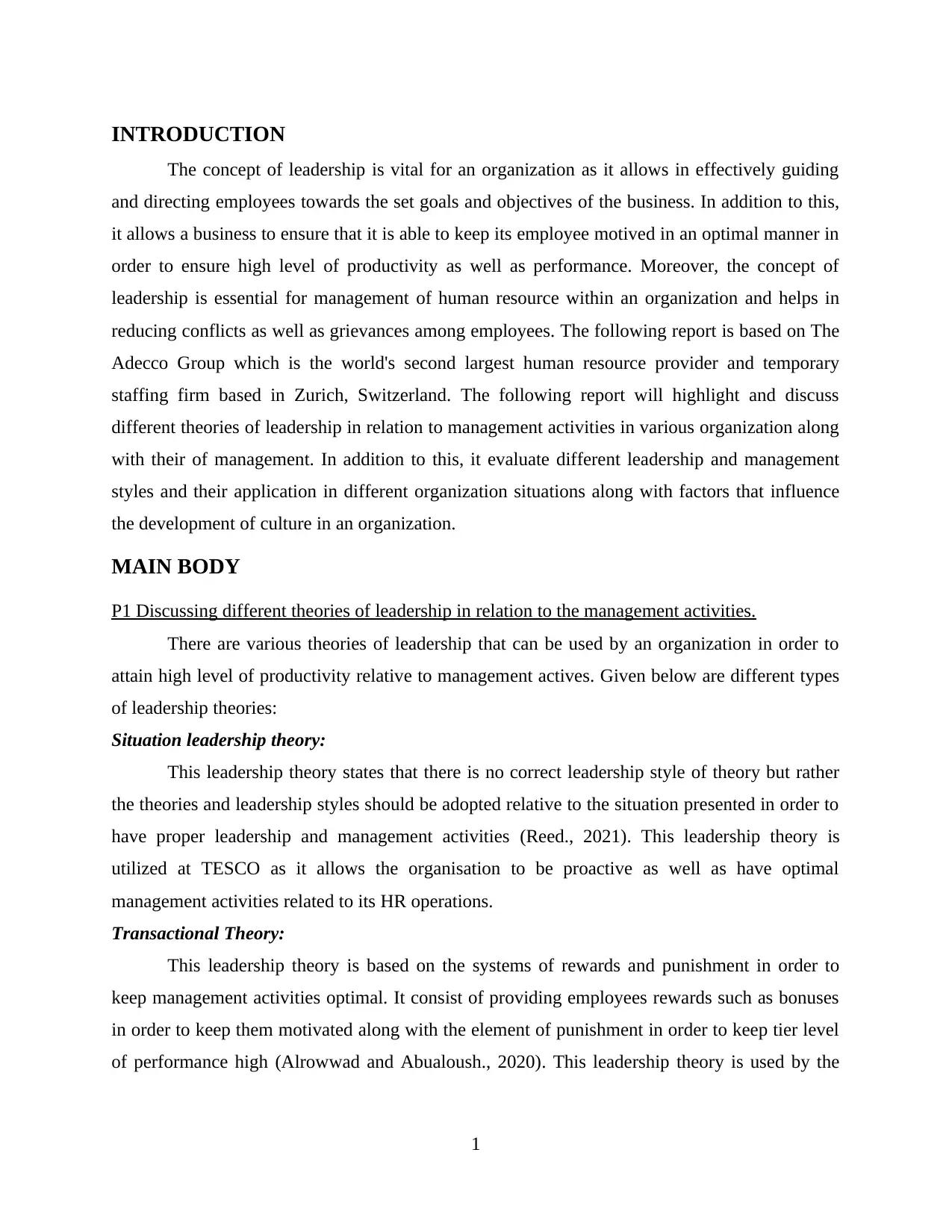
INTRODUCTION
The concept of leadership is vital for an organization as it allows in effectively guiding
and directing employees towards the set goals and objectives of the business. In addition to this,
it allows a business to ensure that it is able to keep its employee motived in an optimal manner in
order to ensure high level of productivity as well as performance. Moreover, the concept of
leadership is essential for management of human resource within an organization and helps in
reducing conflicts as well as grievances among employees. The following report is based on The
Adecco Group which is the world's second largest human resource provider and temporary
staffing firm based in Zurich, Switzerland. The following report will highlight and discuss
different theories of leadership in relation to management activities in various organization along
with their of management. In addition to this, it evaluate different leadership and management
styles and their application in different organization situations along with factors that influence
the development of culture in an organization.
MAIN BODY
P1 Discussing different theories of leadership in relation to the management activities.
There are various theories of leadership that can be used by an organization in order to
attain high level of productivity relative to management actives. Given below are different types
of leadership theories:
Situation leadership theory:
This leadership theory states that there is no correct leadership style of theory but rather
the theories and leadership styles should be adopted relative to the situation presented in order to
have proper leadership and management activities (Reed., 2021). This leadership theory is
utilized at TESCO as it allows the organisation to be proactive as well as have optimal
management activities related to its HR operations.
Transactional Theory:
This leadership theory is based on the systems of rewards and punishment in order to
keep management activities optimal. It consist of providing employees rewards such as bonuses
in order to keep them motivated along with the element of punishment in order to keep tier level
of performance high (Alrowwad and Abualoush., 2020). This leadership theory is used by the
1
The concept of leadership is vital for an organization as it allows in effectively guiding
and directing employees towards the set goals and objectives of the business. In addition to this,
it allows a business to ensure that it is able to keep its employee motived in an optimal manner in
order to ensure high level of productivity as well as performance. Moreover, the concept of
leadership is essential for management of human resource within an organization and helps in
reducing conflicts as well as grievances among employees. The following report is based on The
Adecco Group which is the world's second largest human resource provider and temporary
staffing firm based in Zurich, Switzerland. The following report will highlight and discuss
different theories of leadership in relation to management activities in various organization along
with their of management. In addition to this, it evaluate different leadership and management
styles and their application in different organization situations along with factors that influence
the development of culture in an organization.
MAIN BODY
P1 Discussing different theories of leadership in relation to the management activities.
There are various theories of leadership that can be used by an organization in order to
attain high level of productivity relative to management actives. Given below are different types
of leadership theories:
Situation leadership theory:
This leadership theory states that there is no correct leadership style of theory but rather
the theories and leadership styles should be adopted relative to the situation presented in order to
have proper leadership and management activities (Reed., 2021). This leadership theory is
utilized at TESCO as it allows the organisation to be proactive as well as have optimal
management activities related to its HR operations.
Transactional Theory:
This leadership theory is based on the systems of rewards and punishment in order to
keep management activities optimal. It consist of providing employees rewards such as bonuses
in order to keep them motivated along with the element of punishment in order to keep tier level
of performance high (Alrowwad and Abualoush., 2020). This leadership theory is used by the
1
⊘ This is a preview!⊘
Do you want full access?
Subscribe today to unlock all pages.

Trusted by 1+ million students worldwide
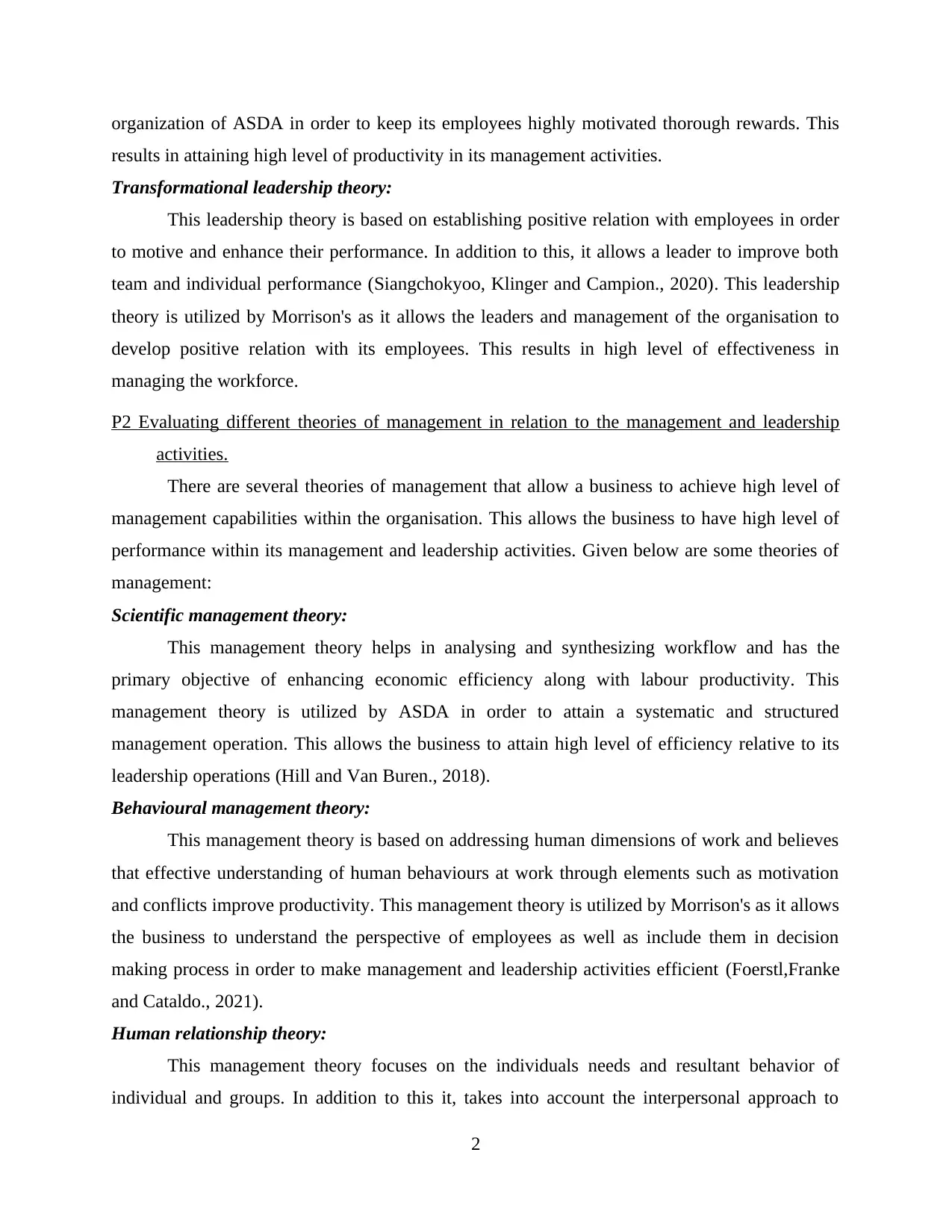
organization of ASDA in order to keep its employees highly motivated thorough rewards. This
results in attaining high level of productivity in its management activities.
Transformational leadership theory:
This leadership theory is based on establishing positive relation with employees in order
to motive and enhance their performance. In addition to this, it allows a leader to improve both
team and individual performance (Siangchokyoo, Klinger and Campion., 2020). This leadership
theory is utilized by Morrison's as it allows the leaders and management of the organisation to
develop positive relation with its employees. This results in high level of effectiveness in
managing the workforce.
P2 Evaluating different theories of management in relation to the management and leadership
activities.
There are several theories of management that allow a business to achieve high level of
management capabilities within the organisation. This allows the business to have high level of
performance within its management and leadership activities. Given below are some theories of
management:
Scientific management theory:
This management theory helps in analysing and synthesizing workflow and has the
primary objective of enhancing economic efficiency along with labour productivity. This
management theory is utilized by ASDA in order to attain a systematic and structured
management operation. This allows the business to attain high level of efficiency relative to its
leadership operations (Hill and Van Buren., 2018).
Behavioural management theory:
This management theory is based on addressing human dimensions of work and believes
that effective understanding of human behaviours at work through elements such as motivation
and conflicts improve productivity. This management theory is utilized by Morrison's as it allows
the business to understand the perspective of employees as well as include them in decision
making process in order to make management and leadership activities efficient (Foerstl,Franke
and Cataldo., 2021).
Human relationship theory:
This management theory focuses on the individuals needs and resultant behavior of
individual and groups. In addition to this it, takes into account the interpersonal approach to
2
results in attaining high level of productivity in its management activities.
Transformational leadership theory:
This leadership theory is based on establishing positive relation with employees in order
to motive and enhance their performance. In addition to this, it allows a leader to improve both
team and individual performance (Siangchokyoo, Klinger and Campion., 2020). This leadership
theory is utilized by Morrison's as it allows the leaders and management of the organisation to
develop positive relation with its employees. This results in high level of effectiveness in
managing the workforce.
P2 Evaluating different theories of management in relation to the management and leadership
activities.
There are several theories of management that allow a business to achieve high level of
management capabilities within the organisation. This allows the business to have high level of
performance within its management and leadership activities. Given below are some theories of
management:
Scientific management theory:
This management theory helps in analysing and synthesizing workflow and has the
primary objective of enhancing economic efficiency along with labour productivity. This
management theory is utilized by ASDA in order to attain a systematic and structured
management operation. This allows the business to attain high level of efficiency relative to its
leadership operations (Hill and Van Buren., 2018).
Behavioural management theory:
This management theory is based on addressing human dimensions of work and believes
that effective understanding of human behaviours at work through elements such as motivation
and conflicts improve productivity. This management theory is utilized by Morrison's as it allows
the business to understand the perspective of employees as well as include them in decision
making process in order to make management and leadership activities efficient (Foerstl,Franke
and Cataldo., 2021).
Human relationship theory:
This management theory focuses on the individuals needs and resultant behavior of
individual and groups. In addition to this it, takes into account the interpersonal approach to
2
Paraphrase This Document
Need a fresh take? Get an instant paraphrase of this document with our AI Paraphraser
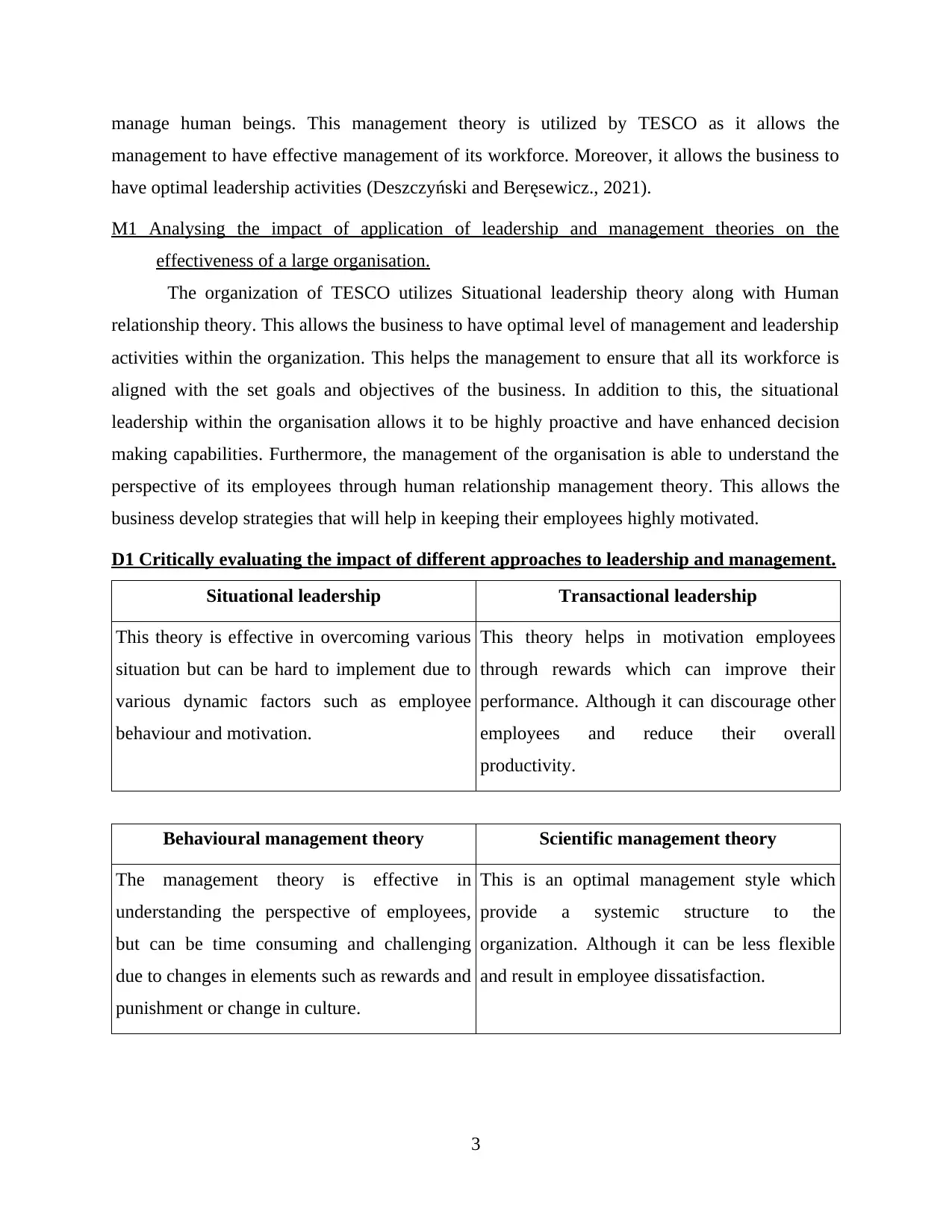
manage human beings. This management theory is utilized by TESCO as it allows the
management to have effective management of its workforce. Moreover, it allows the business to
have optimal leadership activities (Deszczyński and Beręsewicz., 2021).
M1 Analysing the impact of application of leadership and management theories on the
effectiveness of a large organisation.
The organization of TESCO utilizes Situational leadership theory along with Human
relationship theory. This allows the business to have optimal level of management and leadership
activities within the organization. This helps the management to ensure that all its workforce is
aligned with the set goals and objectives of the business. In addition to this, the situational
leadership within the organisation allows it to be highly proactive and have enhanced decision
making capabilities. Furthermore, the management of the organisation is able to understand the
perspective of its employees through human relationship management theory. This allows the
business develop strategies that will help in keeping their employees highly motivated.
D1 Critically evaluating the impact of different approaches to leadership and management.
Situational leadership Transactional leadership
This theory is effective in overcoming various
situation but can be hard to implement due to
various dynamic factors such as employee
behaviour and motivation.
This theory helps in motivation employees
through rewards which can improve their
performance. Although it can discourage other
employees and reduce their overall
productivity.
Behavioural management theory Scientific management theory
The management theory is effective in
understanding the perspective of employees,
but can be time consuming and challenging
due to changes in elements such as rewards and
punishment or change in culture.
This is an optimal management style which
provide a systemic structure to the
organization. Although it can be less flexible
and result in employee dissatisfaction.
3
management to have effective management of its workforce. Moreover, it allows the business to
have optimal leadership activities (Deszczyński and Beręsewicz., 2021).
M1 Analysing the impact of application of leadership and management theories on the
effectiveness of a large organisation.
The organization of TESCO utilizes Situational leadership theory along with Human
relationship theory. This allows the business to have optimal level of management and leadership
activities within the organization. This helps the management to ensure that all its workforce is
aligned with the set goals and objectives of the business. In addition to this, the situational
leadership within the organisation allows it to be highly proactive and have enhanced decision
making capabilities. Furthermore, the management of the organisation is able to understand the
perspective of its employees through human relationship management theory. This allows the
business develop strategies that will help in keeping their employees highly motivated.
D1 Critically evaluating the impact of different approaches to leadership and management.
Situational leadership Transactional leadership
This theory is effective in overcoming various
situation but can be hard to implement due to
various dynamic factors such as employee
behaviour and motivation.
This theory helps in motivation employees
through rewards which can improve their
performance. Although it can discourage other
employees and reduce their overall
productivity.
Behavioural management theory Scientific management theory
The management theory is effective in
understanding the perspective of employees,
but can be time consuming and challenging
due to changes in elements such as rewards and
punishment or change in culture.
This is an optimal management style which
provide a systemic structure to the
organization. Although it can be less flexible
and result in employee dissatisfaction.
3
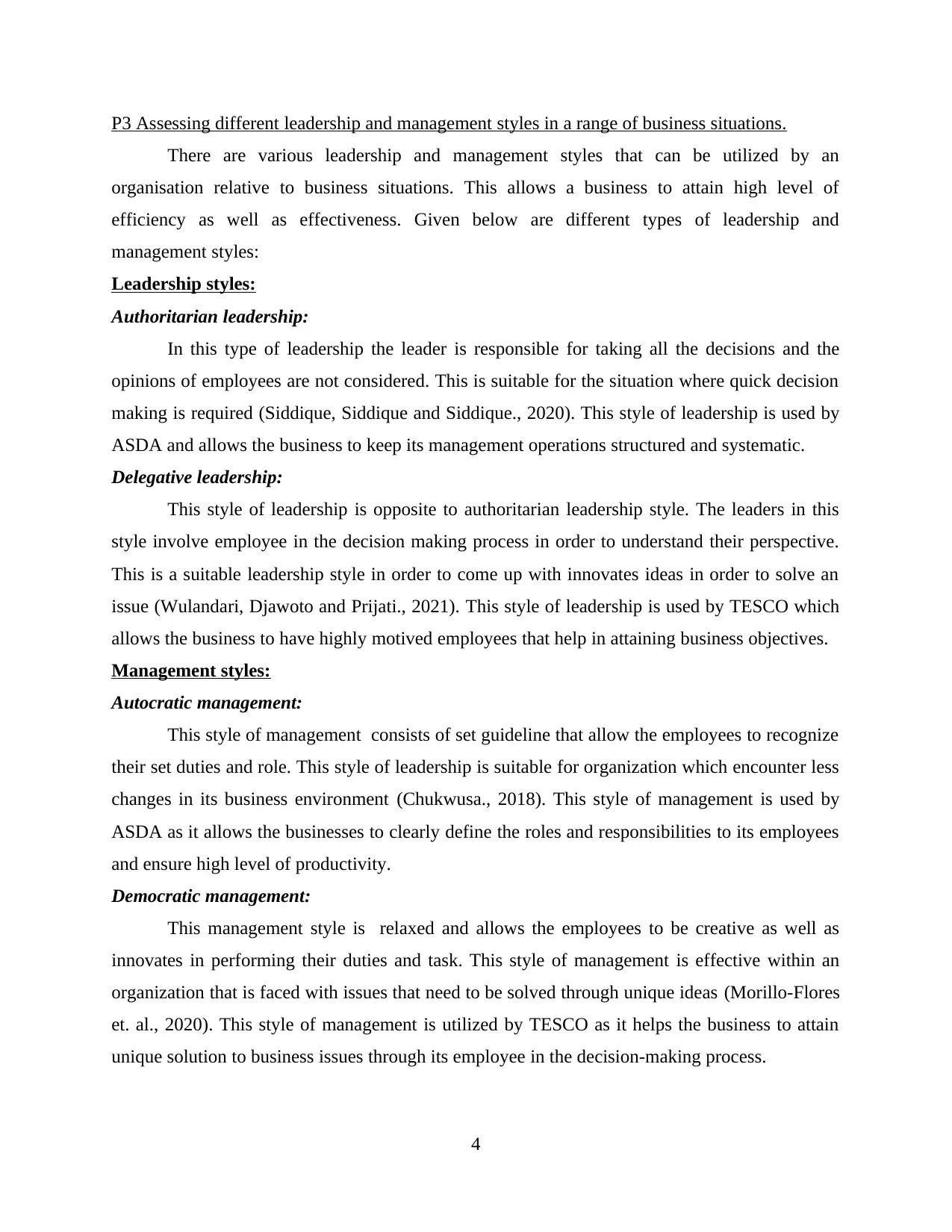
P3 Assessing different leadership and management styles in a range of business situations.
There are various leadership and management styles that can be utilized by an
organisation relative to business situations. This allows a business to attain high level of
efficiency as well as effectiveness. Given below are different types of leadership and
management styles:
Leadership styles:
Authoritarian leadership:
In this type of leadership the leader is responsible for taking all the decisions and the
opinions of employees are not considered. This is suitable for the situation where quick decision
making is required (Siddique, Siddique and Siddique., 2020). This style of leadership is used by
ASDA and allows the business to keep its management operations structured and systematic.
Delegative leadership:
This style of leadership is opposite to authoritarian leadership style. The leaders in this
style involve employee in the decision making process in order to understand their perspective.
This is a suitable leadership style in order to come up with innovates ideas in order to solve an
issue (Wulandari, Djawoto and Prijati., 2021). This style of leadership is used by TESCO which
allows the business to have highly motived employees that help in attaining business objectives.
Management styles:
Autocratic management:
This style of management consists of set guideline that allow the employees to recognize
their set duties and role. This style of leadership is suitable for organization which encounter less
changes in its business environment (Chukwusa., 2018). This style of management is used by
ASDA as it allows the businesses to clearly define the roles and responsibilities to its employees
and ensure high level of productivity.
Democratic management:
This management style is relaxed and allows the employees to be creative as well as
innovates in performing their duties and task. This style of management is effective within an
organization that is faced with issues that need to be solved through unique ideas (Morillo-Flores
et. al., 2020). This style of management is utilized by TESCO as it helps the business to attain
unique solution to business issues through its employee in the decision-making process.
4
There are various leadership and management styles that can be utilized by an
organisation relative to business situations. This allows a business to attain high level of
efficiency as well as effectiveness. Given below are different types of leadership and
management styles:
Leadership styles:
Authoritarian leadership:
In this type of leadership the leader is responsible for taking all the decisions and the
opinions of employees are not considered. This is suitable for the situation where quick decision
making is required (Siddique, Siddique and Siddique., 2020). This style of leadership is used by
ASDA and allows the business to keep its management operations structured and systematic.
Delegative leadership:
This style of leadership is opposite to authoritarian leadership style. The leaders in this
style involve employee in the decision making process in order to understand their perspective.
This is a suitable leadership style in order to come up with innovates ideas in order to solve an
issue (Wulandari, Djawoto and Prijati., 2021). This style of leadership is used by TESCO which
allows the business to have highly motived employees that help in attaining business objectives.
Management styles:
Autocratic management:
This style of management consists of set guideline that allow the employees to recognize
their set duties and role. This style of leadership is suitable for organization which encounter less
changes in its business environment (Chukwusa., 2018). This style of management is used by
ASDA as it allows the businesses to clearly define the roles and responsibilities to its employees
and ensure high level of productivity.
Democratic management:
This management style is relaxed and allows the employees to be creative as well as
innovates in performing their duties and task. This style of management is effective within an
organization that is faced with issues that need to be solved through unique ideas (Morillo-Flores
et. al., 2020). This style of management is utilized by TESCO as it helps the business to attain
unique solution to business issues through its employee in the decision-making process.
4
⊘ This is a preview!⊘
Do you want full access?
Subscribe today to unlock all pages.

Trusted by 1+ million students worldwide
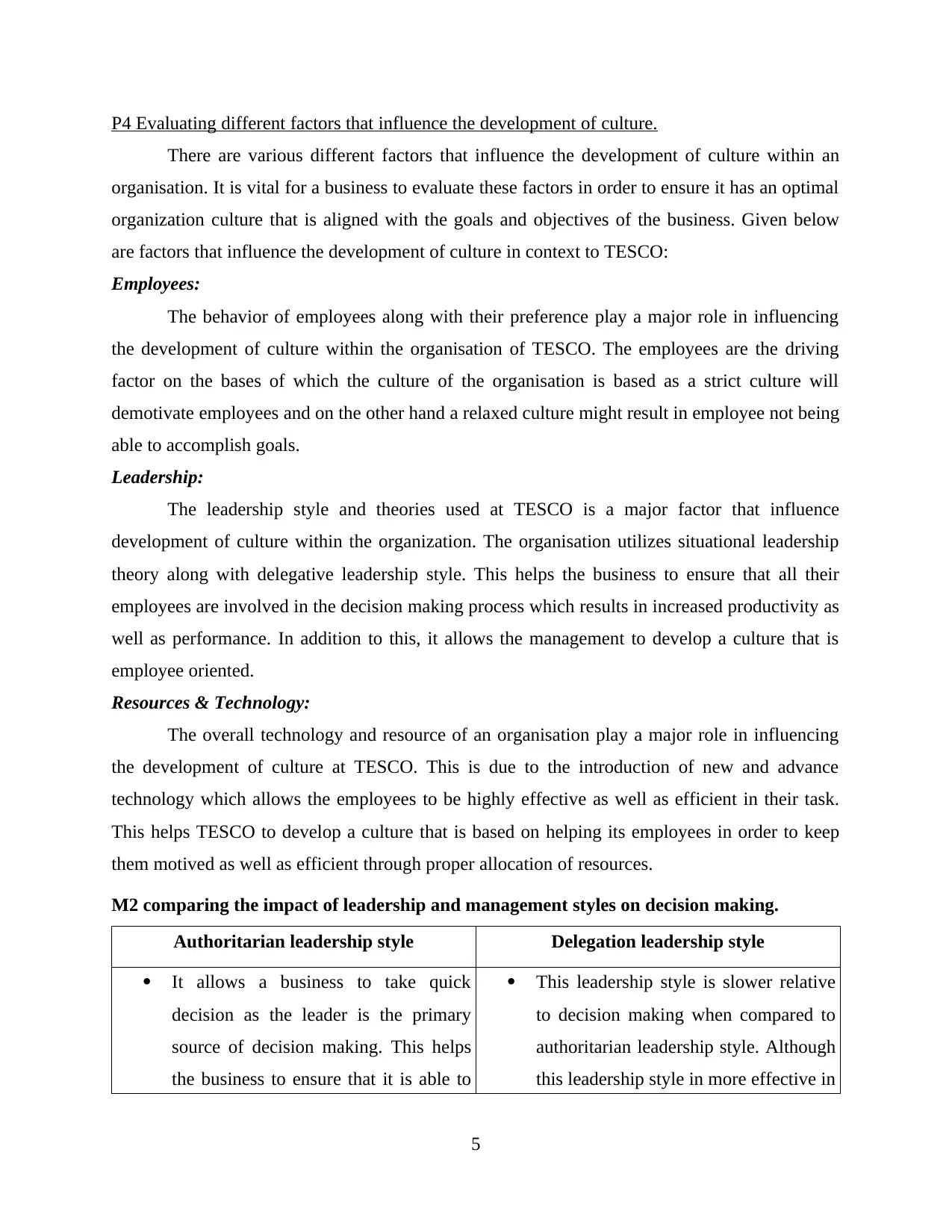
P4 Evaluating different factors that influence the development of culture.
There are various different factors that influence the development of culture within an
organisation. It is vital for a business to evaluate these factors in order to ensure it has an optimal
organization culture that is aligned with the goals and objectives of the business. Given below
are factors that influence the development of culture in context to TESCO:
Employees:
The behavior of employees along with their preference play a major role in influencing
the development of culture within the organisation of TESCO. The employees are the driving
factor on the bases of which the culture of the organisation is based as a strict culture will
demotivate employees and on the other hand a relaxed culture might result in employee not being
able to accomplish goals.
Leadership:
The leadership style and theories used at TESCO is a major factor that influence
development of culture within the organization. The organisation utilizes situational leadership
theory along with delegative leadership style. This helps the business to ensure that all their
employees are involved in the decision making process which results in increased productivity as
well as performance. In addition to this, it allows the management to develop a culture that is
employee oriented.
Resources & Technology:
The overall technology and resource of an organisation play a major role in influencing
the development of culture at TESCO. This is due to the introduction of new and advance
technology which allows the employees to be highly effective as well as efficient in their task.
This helps TESCO to develop a culture that is based on helping its employees in order to keep
them motived as well as efficient through proper allocation of resources.
M2 comparing the impact of leadership and management styles on decision making.
Authoritarian leadership style Delegation leadership style
It allows a business to take quick
decision as the leader is the primary
source of decision making. This helps
the business to ensure that it is able to
This leadership style is slower relative
to decision making when compared to
authoritarian leadership style. Although
this leadership style in more effective in
5
There are various different factors that influence the development of culture within an
organisation. It is vital for a business to evaluate these factors in order to ensure it has an optimal
organization culture that is aligned with the goals and objectives of the business. Given below
are factors that influence the development of culture in context to TESCO:
Employees:
The behavior of employees along with their preference play a major role in influencing
the development of culture within the organisation of TESCO. The employees are the driving
factor on the bases of which the culture of the organisation is based as a strict culture will
demotivate employees and on the other hand a relaxed culture might result in employee not being
able to accomplish goals.
Leadership:
The leadership style and theories used at TESCO is a major factor that influence
development of culture within the organization. The organisation utilizes situational leadership
theory along with delegative leadership style. This helps the business to ensure that all their
employees are involved in the decision making process which results in increased productivity as
well as performance. In addition to this, it allows the management to develop a culture that is
employee oriented.
Resources & Technology:
The overall technology and resource of an organisation play a major role in influencing
the development of culture at TESCO. This is due to the introduction of new and advance
technology which allows the employees to be highly effective as well as efficient in their task.
This helps TESCO to develop a culture that is based on helping its employees in order to keep
them motived as well as efficient through proper allocation of resources.
M2 comparing the impact of leadership and management styles on decision making.
Authoritarian leadership style Delegation leadership style
It allows a business to take quick
decision as the leader is the primary
source of decision making. This helps
the business to ensure that it is able to
This leadership style is slower relative
to decision making when compared to
authoritarian leadership style. Although
this leadership style in more effective in
5
Paraphrase This Document
Need a fresh take? Get an instant paraphrase of this document with our AI Paraphraser
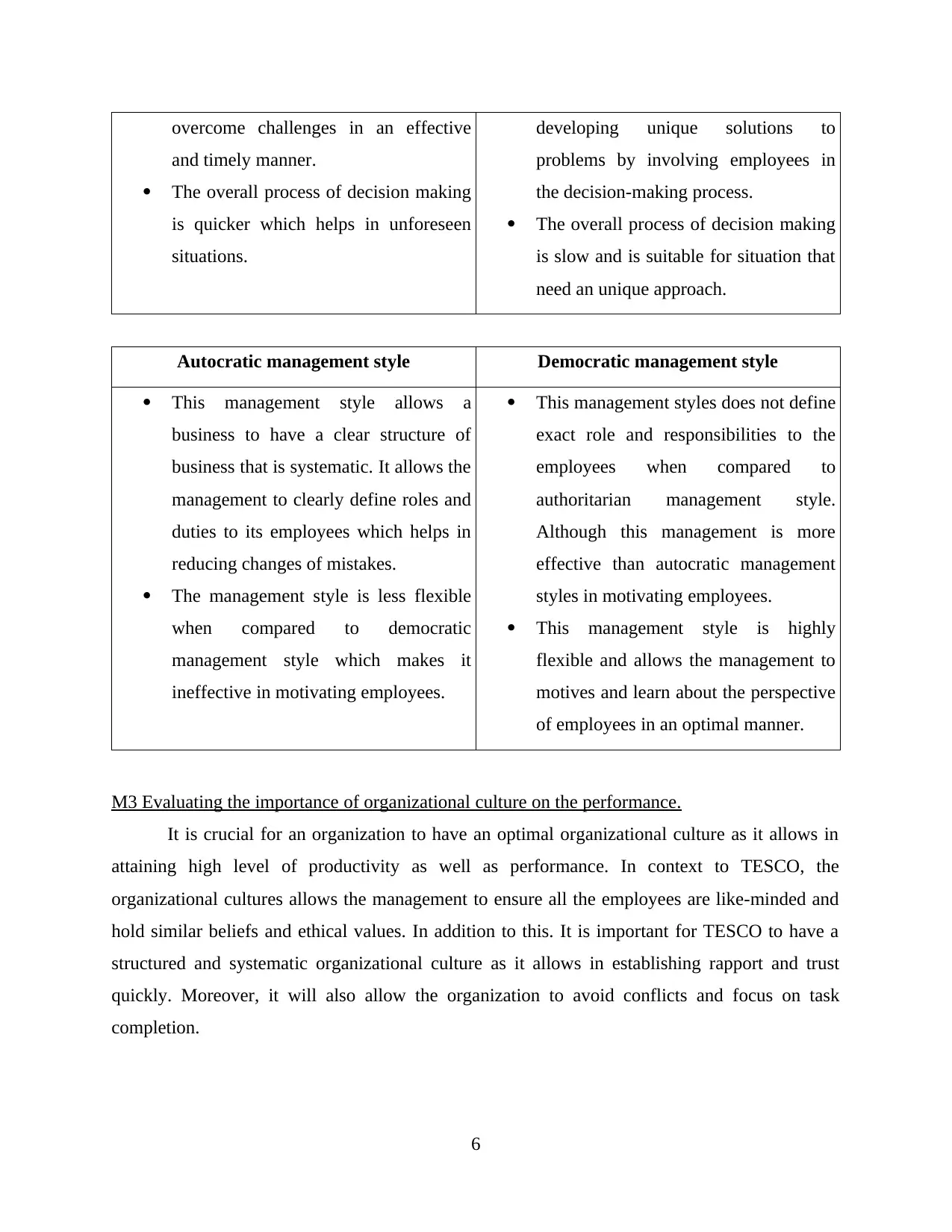
overcome challenges in an effective
and timely manner.
The overall process of decision making
is quicker which helps in unforeseen
situations.
developing unique solutions to
problems by involving employees in
the decision-making process.
The overall process of decision making
is slow and is suitable for situation that
need an unique approach.
Autocratic management style Democratic management style
This management style allows a
business to have a clear structure of
business that is systematic. It allows the
management to clearly define roles and
duties to its employees which helps in
reducing changes of mistakes.
The management style is less flexible
when compared to democratic
management style which makes it
ineffective in motivating employees.
This management styles does not define
exact role and responsibilities to the
employees when compared to
authoritarian management style.
Although this management is more
effective than autocratic management
styles in motivating employees.
This management style is highly
flexible and allows the management to
motives and learn about the perspective
of employees in an optimal manner.
M3 Evaluating the importance of organizational culture on the performance.
It is crucial for an organization to have an optimal organizational culture as it allows in
attaining high level of productivity as well as performance. In context to TESCO, the
organizational cultures allows the management to ensure all the employees are like-minded and
hold similar beliefs and ethical values. In addition to this. It is important for TESCO to have a
structured and systematic organizational culture as it allows in establishing rapport and trust
quickly. Moreover, it will also allow the organization to avoid conflicts and focus on task
completion.
6
and timely manner.
The overall process of decision making
is quicker which helps in unforeseen
situations.
developing unique solutions to
problems by involving employees in
the decision-making process.
The overall process of decision making
is slow and is suitable for situation that
need an unique approach.
Autocratic management style Democratic management style
This management style allows a
business to have a clear structure of
business that is systematic. It allows the
management to clearly define roles and
duties to its employees which helps in
reducing changes of mistakes.
The management style is less flexible
when compared to democratic
management style which makes it
ineffective in motivating employees.
This management styles does not define
exact role and responsibilities to the
employees when compared to
authoritarian management style.
Although this management is more
effective than autocratic management
styles in motivating employees.
This management style is highly
flexible and allows the management to
motives and learn about the perspective
of employees in an optimal manner.
M3 Evaluating the importance of organizational culture on the performance.
It is crucial for an organization to have an optimal organizational culture as it allows in
attaining high level of productivity as well as performance. In context to TESCO, the
organizational cultures allows the management to ensure all the employees are like-minded and
hold similar beliefs and ethical values. In addition to this. It is important for TESCO to have a
structured and systematic organizational culture as it allows in establishing rapport and trust
quickly. Moreover, it will also allow the organization to avoid conflicts and focus on task
completion.
6
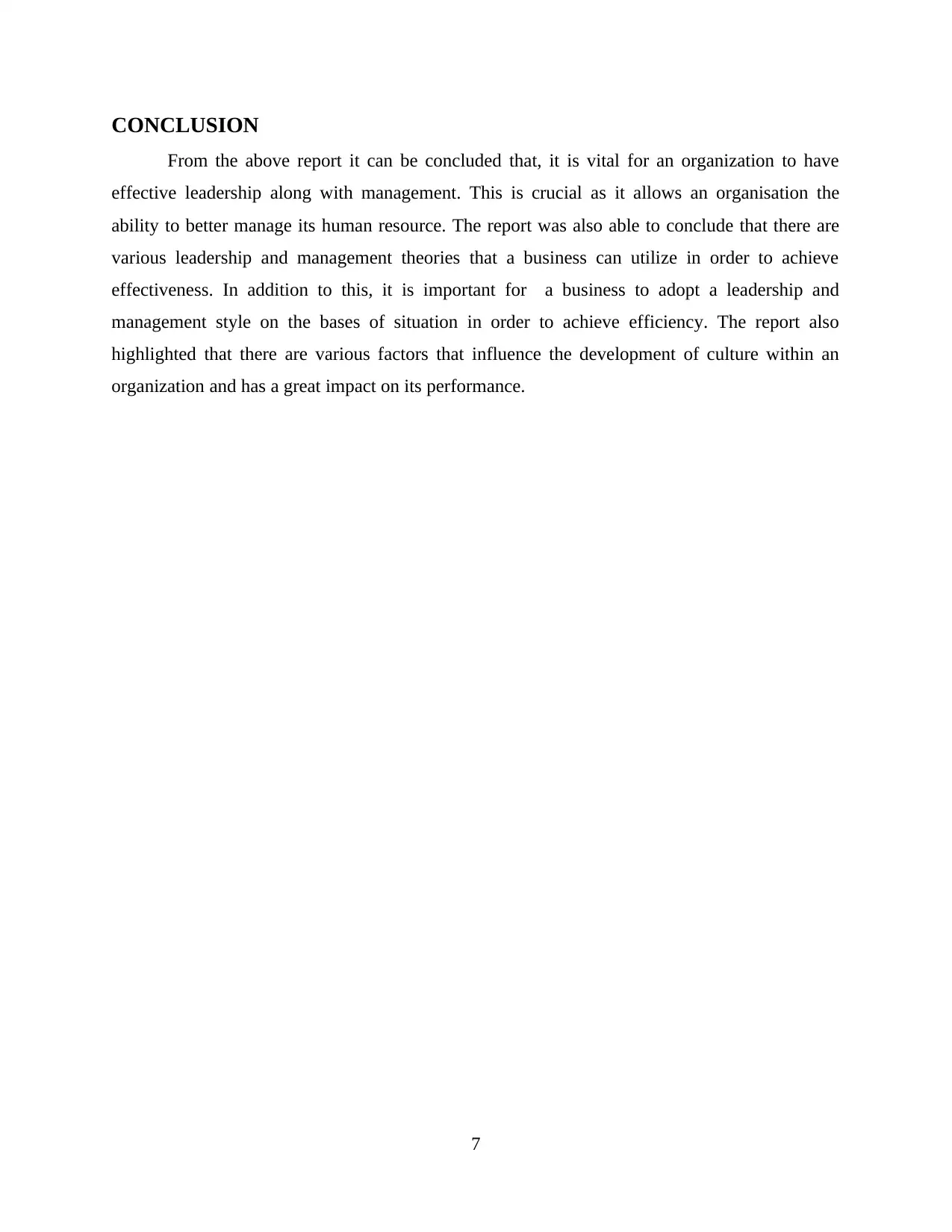
CONCLUSION
From the above report it can be concluded that, it is vital for an organization to have
effective leadership along with management. This is crucial as it allows an organisation the
ability to better manage its human resource. The report was also able to conclude that there are
various leadership and management theories that a business can utilize in order to achieve
effectiveness. In addition to this, it is important for a business to adopt a leadership and
management style on the bases of situation in order to achieve efficiency. The report also
highlighted that there are various factors that influence the development of culture within an
organization and has a great impact on its performance.
7
From the above report it can be concluded that, it is vital for an organization to have
effective leadership along with management. This is crucial as it allows an organisation the
ability to better manage its human resource. The report was also able to conclude that there are
various leadership and management theories that a business can utilize in order to achieve
effectiveness. In addition to this, it is important for a business to adopt a leadership and
management style on the bases of situation in order to achieve efficiency. The report also
highlighted that there are various factors that influence the development of culture within an
organization and has a great impact on its performance.
7
⊘ This is a preview!⊘
Do you want full access?
Subscribe today to unlock all pages.

Trusted by 1+ million students worldwide
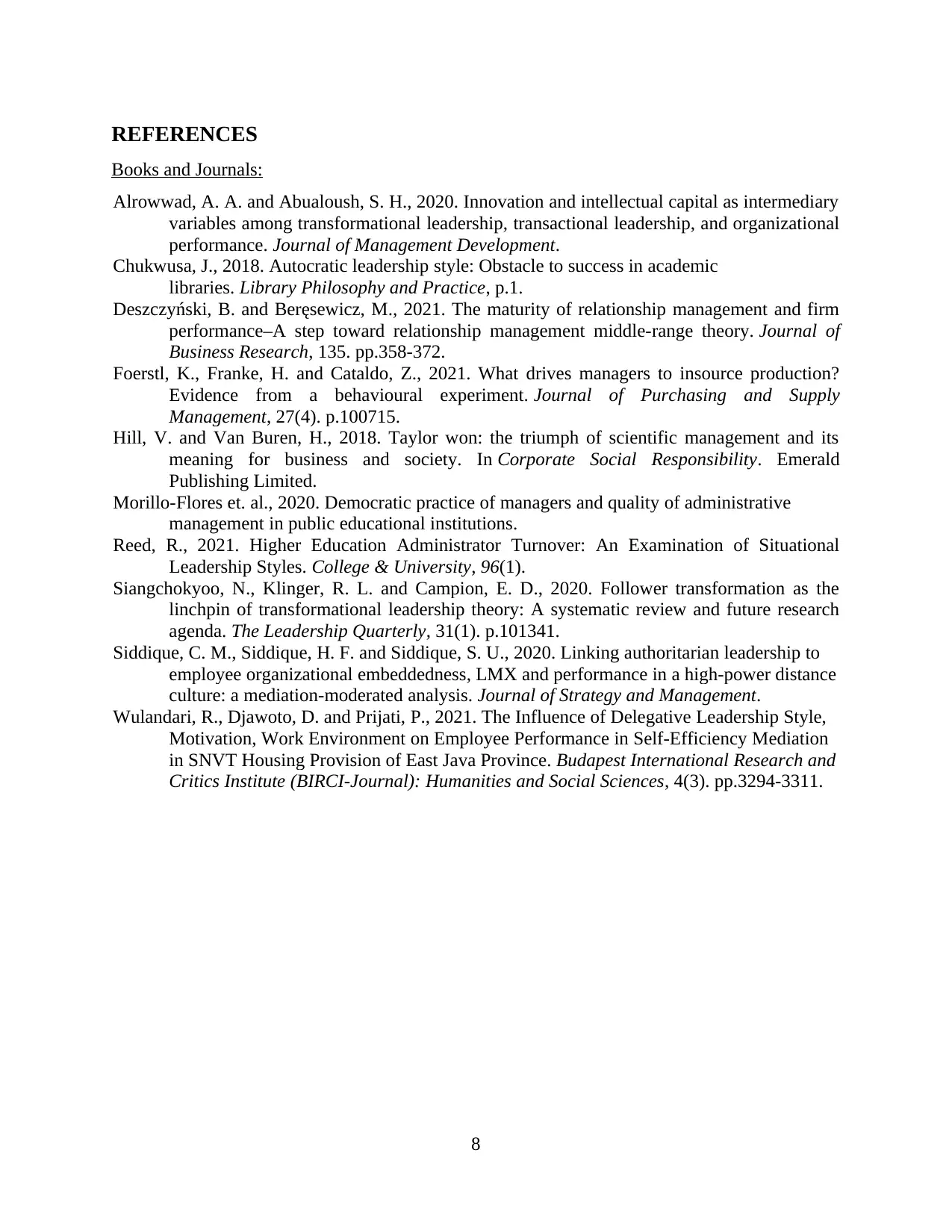
REFERENCES
Books and Journals:
Alrowwad, A. A. and Abualoush, S. H., 2020. Innovation and intellectual capital as intermediary
variables among transformational leadership, transactional leadership, and organizational
performance. Journal of Management Development.
Chukwusa, J., 2018. Autocratic leadership style: Obstacle to success in academic
libraries. Library Philosophy and Practice, p.1.
Deszczyński, B. and Beręsewicz, M., 2021. The maturity of relationship management and firm
performance–A step toward relationship management middle-range theory. Journal of
Business Research, 135. pp.358-372.
Foerstl, K., Franke, H. and Cataldo, Z., 2021. What drives managers to insource production?
Evidence from a behavioural experiment. Journal of Purchasing and Supply
Management, 27(4). p.100715.
Hill, V. and Van Buren, H., 2018. Taylor won: the triumph of scientific management and its
meaning for business and society. In Corporate Social Responsibility. Emerald
Publishing Limited.
Morillo-Flores et. al., 2020. Democratic practice of managers and quality of administrative
management in public educational institutions.
Reed, R., 2021. Higher Education Administrator Turnover: An Examination of Situational
Leadership Styles. College & University, 96(1).
Siangchokyoo, N., Klinger, R. L. and Campion, E. D., 2020. Follower transformation as the
linchpin of transformational leadership theory: A systematic review and future research
agenda. The Leadership Quarterly, 31(1). p.101341.
Siddique, C. M., Siddique, H. F. and Siddique, S. U., 2020. Linking authoritarian leadership to
employee organizational embeddedness, LMX and performance in a high-power distance
culture: a mediation-moderated analysis. Journal of Strategy and Management.
Wulandari, R., Djawoto, D. and Prijati, P., 2021. The Influence of Delegative Leadership Style,
Motivation, Work Environment on Employee Performance in Self-Efficiency Mediation
in SNVT Housing Provision of East Java Province. Budapest International Research and
Critics Institute (BIRCI-Journal): Humanities and Social Sciences, 4(3). pp.3294-3311.
8
Books and Journals:
Alrowwad, A. A. and Abualoush, S. H., 2020. Innovation and intellectual capital as intermediary
variables among transformational leadership, transactional leadership, and organizational
performance. Journal of Management Development.
Chukwusa, J., 2018. Autocratic leadership style: Obstacle to success in academic
libraries. Library Philosophy and Practice, p.1.
Deszczyński, B. and Beręsewicz, M., 2021. The maturity of relationship management and firm
performance–A step toward relationship management middle-range theory. Journal of
Business Research, 135. pp.358-372.
Foerstl, K., Franke, H. and Cataldo, Z., 2021. What drives managers to insource production?
Evidence from a behavioural experiment. Journal of Purchasing and Supply
Management, 27(4). p.100715.
Hill, V. and Van Buren, H., 2018. Taylor won: the triumph of scientific management and its
meaning for business and society. In Corporate Social Responsibility. Emerald
Publishing Limited.
Morillo-Flores et. al., 2020. Democratic practice of managers and quality of administrative
management in public educational institutions.
Reed, R., 2021. Higher Education Administrator Turnover: An Examination of Situational
Leadership Styles. College & University, 96(1).
Siangchokyoo, N., Klinger, R. L. and Campion, E. D., 2020. Follower transformation as the
linchpin of transformational leadership theory: A systematic review and future research
agenda. The Leadership Quarterly, 31(1). p.101341.
Siddique, C. M., Siddique, H. F. and Siddique, S. U., 2020. Linking authoritarian leadership to
employee organizational embeddedness, LMX and performance in a high-power distance
culture: a mediation-moderated analysis. Journal of Strategy and Management.
Wulandari, R., Djawoto, D. and Prijati, P., 2021. The Influence of Delegative Leadership Style,
Motivation, Work Environment on Employee Performance in Self-Efficiency Mediation
in SNVT Housing Provision of East Java Province. Budapest International Research and
Critics Institute (BIRCI-Journal): Humanities and Social Sciences, 4(3). pp.3294-3311.
8
Paraphrase This Document
Need a fresh take? Get an instant paraphrase of this document with our AI Paraphraser

9
1 out of 11
Related Documents
Your All-in-One AI-Powered Toolkit for Academic Success.
+13062052269
info@desklib.com
Available 24*7 on WhatsApp / Email
![[object Object]](/_next/static/media/star-bottom.7253800d.svg)
Unlock your academic potential
Copyright © 2020–2026 A2Z Services. All Rights Reserved. Developed and managed by ZUCOL.





